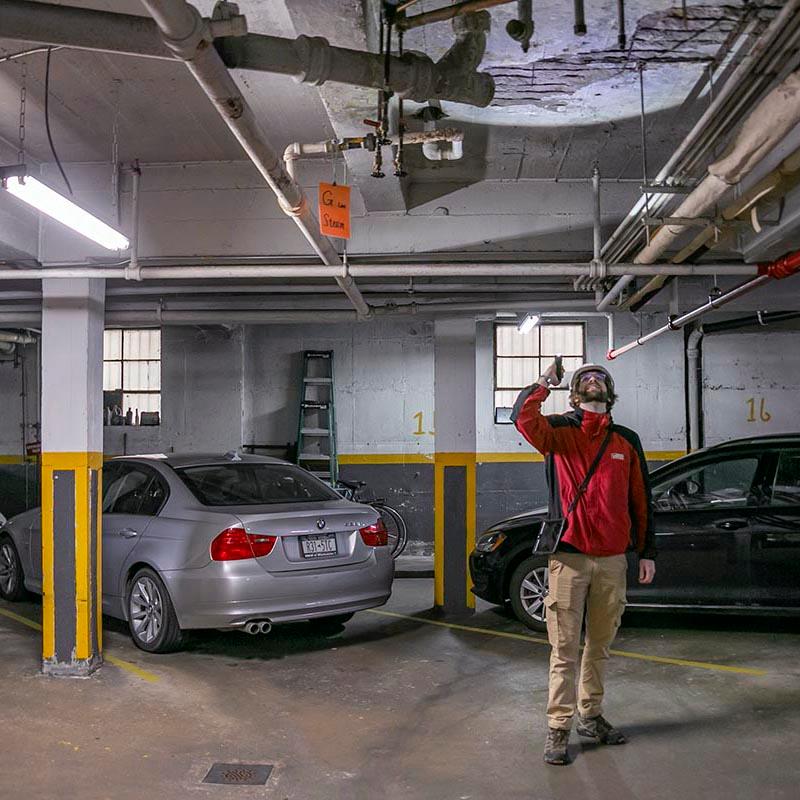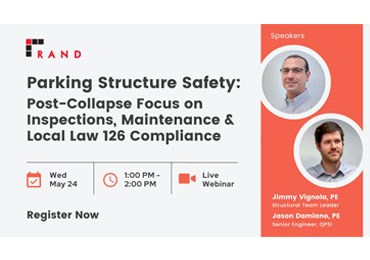Lessons from NYC’s Fatal Parking Garage Collapse

The recent parking garage collapse at 57 Ann Street in Lower Manhattan has underscored the urgent need for regular inspections and maintenance of parking structures. In response, the City is rapidly conducting inspections across the city, especially those with open violations. The result so far: Three garages shut down completely and 12 partially closed due to unsafe conditions. This tragic event highlights the importance of routine inspections and upkeep in maintaining these structures’ safety and durability.
Unaddressed Violations
The New York Times recently conducted an in-depth examination of the situation revealing a disturbing number of neglected structural issues within NYC’s garages. The investigation brought to light several structural defects triggering recent citations, including extensive concrete erosion, spalling under ceilings, numerous deteriorated and rusted steel beams, and missing or corroded support columns. While the exact cause of the Ann Street collapse is yet to be identified, the garage had numerous pending violations, one from 2003 for hazardous spalled/cracking concrete. Post-collapse images also suggest an overloaded roof.
The Issue of Overcapacity
Overcapacity exacerbates structural issues. The Ann Street garage, cited in 2009 for exceeding its stated capacity, had installed 34 lifts the following year. The use of lifts, while beneficial for maximizing profits for garage operators, notably increases the structural load and can pose safety risks if not properly installed or maintained.
Cinder Concrete Vulnerability
Many of NYC’s older buildings were built using cinder concrete, which is particularly susceptible to damage if not properly maintained. Despite being lightweight and cost-effective, cinder concrete’s porosity makes it vulnerable to water and salt, common elements brought into garages by vehicles. This can lead to corrosion of internal metal reinforcements and subsequent concrete spalling.
Despite these vulnerabilities, old cinder concrete can hold up if properly maintained and protected from external elements. Lack of waterproofing is often noted as a cause for significant structural damage. Unprotected concrete slabs can disintegrate when exposed to water and salt.
The Role of Regular Checks and Maintenance
Routine checks play a crucial part in detecting structural issues before they escalate into serious hazards. Garage owners and managers should be proactive in preserving their structures, rather than relying on city inspections or complaints. This is particularly crucial in older buildings where aging concrete and corroding reinforcements can lead to serious structural damage. As the article points out, the garage that collapsed was nearly 100 years old. The Times identified over 40 parking structures in New York City of the same age or older.
Actions for Garage Owners and Managers
In the wake of the Ann Street collapse, city officials are advocating for accelerated inspections and stronger safety measures. Garage owners should enlist a Qualified Parking Structure Inspector (QPSI), a NYS licensed engineer experienced in structural design and certified by the DOB, to conduct thorough inspections and recommend necessary repairs or improvements. Staying updated with regulations, like the Periodic Inspection of Parking Structures (PIPS) program (per Local Law 126 of 2021), is also advised. The tragic incident at 57 Ann Street, which was due for its first PIPS inspection and filing by December of this year, underscores the importance of timely inspections.
Additionally, garage owners need to monitor their facilities’ capacity. Overloading poses significant safety risks and is a violation of city codes.
Garage owners and managers should give top priority to regular checks, proactive upkeep, and strict adherence to capacity limits to uphold the integrity and longevity of their structures.
Upcoming Webinar
Register to join us live on Wednesday, May 24 at 1:00 PM as we discuss requirements for parking garage inspections under Periodic Inspections of Parking Structures (Local Law 126 of 2021) as well as similar NY State inspection law; offer guidance on effective maintenance and repair; and answer your questions.
Contact RAND
RAND’s Structural Team and QPSIs can assist garage owners and managers in navigating these critical processes. Our structural engineering services for parking structures include:
- Local Law 126/21 inspections conducted by experienced QPSIs
- Compliance assistance to ensure adherence to regulations
- Comprehensive parking garage inspections to identify structural issues
- Customized repair programs tailored to address specific maintenance needs
- Structural assessments and maintenance recommendations
- Emergency inspections for structural failures or urgent situations
- Damage assessment and repair services following emergencies or natural disasters
For more information or to schedule a consultation regarding your property, contact us at (212) 675-8844 or info@randpc.com. We look forward to speaking with you.
Jason Damiano, PE, QPSI is a Senior Structural Engineer and Qualified Parking Structure Inspector on RAND’s Structural Team.

